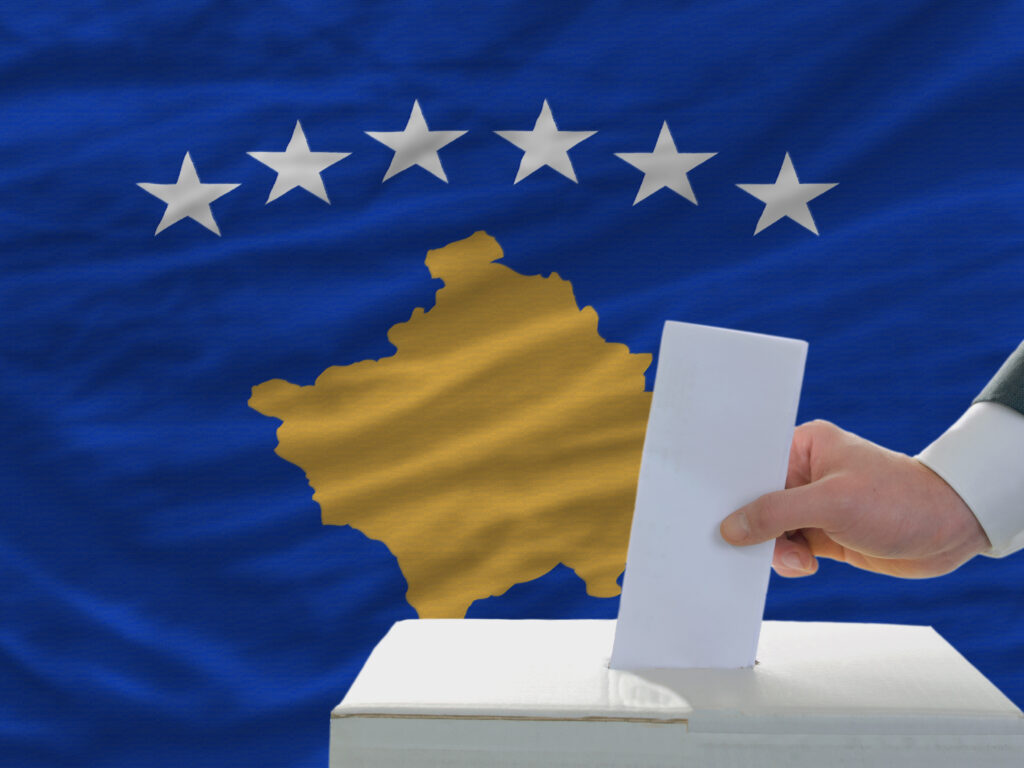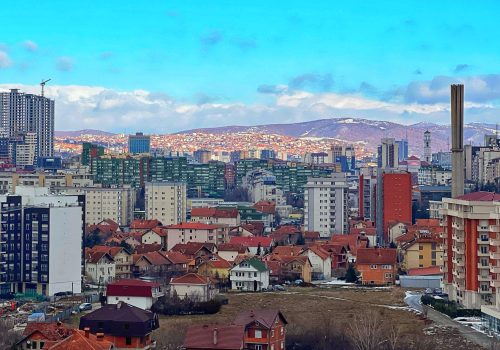After a four-year mandate in Pristina, Prime Minister Albin Kurti faces a test at the polls as Kosovars vote for a new parliament on February 9. With prominent opposition candidates in the running, the election will be a test of Kurti’s political momentum after his sweeping victory in 2021 and will take place against the backdrop of a contentious international landscape for the Western Balkans and the transatlantic community writ large.
Ahead of the election, the Europe Center is answering questions about the key candidates and issues at play.
What is the political context of this election?
Kosovo is gearing up for parliamentary elections on February 9, marking a big moment in its political history—the first time a government has completed a full term since Kosovo declared independence in 2008. Prime Minister Albin Kurti and his party Vetëvendosje (“Self-Determination Movement,” VV), who won a landslide victory in 2021 with 50.28 percent of the vote, are now seeking re-election in what’s shaping up to be a heated contest, as the opposition is determined to make significant gains.
Kurti is a bold and polarizing figure—hailed as a reformer and disruptor by those who want sweeping changes, yet criticized by others who claim his policy undermines progress toward positive regional relations. For many, he is a symbol of hope and progress; for others, his hardline stances, especially on domestic reforms and the stalled dialogue with Serbia, raise red flags. As voters head to the polls, Kurti’s leadership and vision remain at the center of Kosovo’s political debate, sparking questions about the country’s path forward.
Kosovo’s future depends heavily on its integration into Euro-Atlantic institutions, with a new European Commission team and opportunities with the freshly appointed special representative for the normalization dialogue between Kosovo and Serbia. Additionally, a potential shift in priorities of the new US administration adds another layer of uncertainty. As Kosovo navigates this evolving global landscape, its relationship with the United States will play a key role in shaping the country’s future aspirations.
—Ilva Tare is a resident senior fellow with the Atlantic Council’s Europe Center
Kosovo is often viewed as stagnant, and its attempts to build respect and diplomatic recognition on the international stage have been largely ineffective. Although Kurti is heading the longest-serving government since Kosovo’s declaration of independence in 2008, he has been repeatedly accused by opposition parties of delivering little, defying the international community, and complaining about Serbia while missing out on opportunities to build infrastructure and develop Kosovo economically. The results of this election will be a critical indicator of Kosovo’s future.
—Jonathan Moore is a nonresident senior fellow with the Atlantic Council’s Europe Center
Who is Albin Kurti—and who are his main challengers?
Kurti, the current prime minister and leader of VV has long maintained a strong stance on Kosovo’s sovereignty, frequently targeting Serbia’s influence in the region. He has labeled Serbia a “proxy of Russia” and accused Western powers of appeasing Serbian President Aleksandar Vučić. His campaign continues to focus on anti-corruption, national independence, and a tough approach to Kosovo’s relationship with Serbia.
Kurti’s main challengers are the Democratic Party of Kosovo (PDK), now led by Memli Krasniqi, who has nominated Bedri Hamza as their candidate for prime minister, and the Democratic League of Kosovo (LDK), led by Lumir Abdixhiku. The PDK, which won 17 percent of the vote in 2021, is focusing its campaign on economic reform and strengthening Kosovo’s international relationships. Bedri Hamza has emphasized the need for Kosovo to attract foreign investments and improve living standards, proposing pragmatic policies to stabilize the economy and create jobs. The LDK, which secured 13 percent in 2021, advocates for a more balanced approach to the dialogue with Serbia and calls for a reset in Kosovo’s diplomatic strategy. Abdixhiku’s campaign centers on restoring Kosovo’s credibility in international negotiations and rebuilding trust with the West. Both parties have criticized Kurti and his handling of the dialogue with Serbia in particular, which they argue has stalled Kosovo’s domestic and international progress. They emphasize their commitment to economic development, strengthening Kosovo’s international presence, and adopting a more constructive approach to relations with the European Union (EU) and the United States. Despite their criticism, recent polls indicate that while VV maintains a lead, the opposition parties are closing the gap. However, the result remains uncertain as election day approaches.
—Ilva Tare
Kurti entered the political stage as a firebrand, initially making his mark as a student protestor in the late 1990s. His left-leaning party VV gradually built its parliamentary presence starting in 2010. VV was founded on a reputation of refusing to compromise, even with Kosovo’s most important international partners. While Kosovo’s lack of progress toward EU standards may be more apparent outside the country, voters are increasingly aware that they are falling behind. At the same time, many Kosovars view Kurti’s political opposition as either compromised or outright corrupt. The three major opposition parties (Alliance for the Future of Kosovo, or AAK; LDK; and PDK) share similar goals: they want to leverage US and European support to secure NATO and EU membership. However, their difficult histories and bitter rivalries on the local level have prevented them from uniting ahead of the election. There is much talk of joining efforts if VV fails to secure an outright majority, with the most successful of the three parties taking the lead in forming a new government. However, the outcome of such an effort is uncertain. Especially, as all of the three parties have leaders who are determined to succeed on their own. On top of that, it is also conceivable that Kurti could form a coalition with one of them to retain power.
—Jonathan Moore
What do the polls say about who is likely to win?
The question is in the air about what would happen if VV falls short of the 50 percent threshold required to govern with an outright majority. Even though some local media have speculated about a potential coalition between VV and the PDK, Deputy Prime Minister Besnik Bislimi has recently denied this possibility. The presidency, which will become vacant after Vjosa Osmani’s term ends next year, could become a key bargaining chip in such negotiations if they do take place with an opposition party. Kosovo’s ethnic Serbs make up about 2.3 percent of its 1.6 million population, though this figure is contested due to a census boycott by Serbs. The next government will need to face the issue of implementing the Association of Serb-Majority Municipalities (ASM), which aims to address the concerns of Kosovo’s Serbian minority and is backed by both the EU and the United States. Additionally, Serbia is expected to deliver on the de facto recognition of Kosovo.
—Ilva Tare
As is often the case elsewhere in the region, polls in Kosovo have not been very accurate in the past, and VV’s victory in 2021 was unprecedented, with the three opposition parties performing poorly (PDK: 17 percent; LDK: 12.7 percent; AAK: 7.1 percent). Since then, both PDK and LDK have changed their leadership.
—Jonathan Moore
What are the biggest challenges Kosovo’s next government will face?
The United States must play a more prominent role in the Kosovo-Serbia dialogue to address the region’s political complexities. It is unclear how the recent statement by Special Envoy Ric Grenell about Kurti and his government’s relationship with Washington may reflect future US policy toward the region. However, the EU’s inability to break the deadlock has stalled progress. With Serbia’s ongoing ties to Russia and Kosovo’s aspirations to solidify its sovereignty, the United States could leverage its influence to steer both parties toward a more pragmatic, long-term agreement. The shifting international landscape calls for a more balanced approach, emphasizing stronger transatlantic collaboration to foster stability and address unresolved issues between Kosovo and Serbia. A critical aspect of this dialogue is Serbia’s eventual recognition of Kosovo, which could also push the EU’s five non-recognizing members to reconsider their stance, thereby strengthening Kosovo’s international legitimacy. The ultimate goal remains the full normalization of relations, culminating in Serbia’s recognition of Kosovo as an independent state and the country’s integration into Euro-Atlantic institutions.
—Ilva Tare
Kurti has built a reputation on refusing to compromise and takes pride in his unwillingness to normalize relations with Serbia. If the opposition comes to power, they are likely to seek closer ties with Washington and Brussels, but will struggle to make significant progress on normalization in the short term. They had the opportunity of implementing agreed-upon steps in the Belgrade-Pristina Dialogue when in power but chose not to, citing domestic political objections. Incentives to move the normalization Dialogue forward, particularly from the EU, would be important.
—Jonathan Moore
Youth brain drain is a major policy challenge across the Western Balkans, and the next government in Pristina must contend with it. One in four citizens has left the region, driven by low salaries, limited economic opportunities, political instability, and corruption. The World Bank’s latest report on the Western Balkans highlights that emigration from the healthcare sector, in particular, has resulted in over 20 percent of Kosovo’s young talent residing in other European countries. As Kosovo’s population continues to age, this will only intensify, presenting an even greater challenge for the incoming government.
—Stuart Jones is a program assistant in the Atlantic Council’s Europe Center
What obstacles does Kosovo face in achieving its foreign policy goals?
NATO and EU membership remain top priorities for Kosovo’s foreign policy, but both the current government and some of its predecessors have, at times, put the cart before the horse. Even though it has made significant diplomatic efforts to secure global recognition and membership in the Council of Europe, Kosovo remains outside the United Nations. NATO and EU members—some of which have yet to recognize Kosovo’s independence or establish diplomatic relations—continue to demand tangible steps toward “normalization” between Belgrade and Pristina, along with the implementation of past agreements. The timing of this election coincides with the appointment of Danish/EU diplomat Peter Sørensen to head the Belgrade-Pristina Dialogue, potentially shaping the course of future negotiations.
—Jonathan Moore
Kosovo’s path toward EU accession hinges on the outcome of these elections. If Kurti secures another majority mandate, the country could see more political brinkmanship between Kosovo and the EU, particularly if US President Donald Trump pivots away from traditional US support for the region’s Euro-Atlantic integration and Brussels remains divided on enlargement. On the latter, there are positive signs that under High Representative Kaja Kallas, enlargement will be a political priority, at least with regard to Ukraine and Moldova. Renewed enthusiasm for enlargement, spurred by these two countries, should in all logic be good news for the Western Balkans.
If VV is forced into a governing coalition with PDK or LDK, there is some hope that Kurti’s rhetoric could become more moderate, leading to greater openness to dialogue with regional and international partners. However, a PDK-LDK grand coalition excluding VV would likely lead to an unpredictable platform and an unstable mandate. With such widespread support, Kurti in opposition would be a nightmare for a PDK or LDK prime minister, similar to governments elsewhere in Europe, such as in France, Spain, and potentially Germany, where diverse political alliances struggle to maintain cohesion, sometimes at the expense of effective policymaking.
—Stuart Jones
Related reading

The Europe Center promotes leadership, strategies, and analysis to ensure a strong, ambitious, and forward-looking transatlantic relationship.

